7 Healthy Fats to Eat for Weight Loss, Dietitians Say

Fat gets a bad rap when it comes to weight loss, but healthy fats can actually help you shed weight and, even more importantly, protect against chronic illness.
Registered dietitian Kimberly Gomer, MS, RD/LDN, says our generalized fear of fat is unfounded. In fact, she recommends centering healthy fats in your meal plan, right alongside lean sources of protein and nutrient-rich vegetables.
She explains that feeling full and satiated after a meal is the key to successful weight loss and that healthy fats encourage our hunger and satiety hormones, ghrelin and leptin, to regulate our food intake. By stabilizing your cravings and sense of satiety, you’re more likely to see fat-burning and weight loss.
Of course, not all fats are equally good for you. Saturated fats—for instance, those found in red meat, fried foods, processed foods, certain cooking oils, and full-fat dairy products—are best avoided or consumed only minimally.
Wondering which healthy fats are considered best for weight loss and better health? These are the top seven sources, according to experts.
RELATED: 9 High-Fiber Foods for Weight Loss That Will Keep You Full and Satisfied.
1
Extra-virgin olive oil
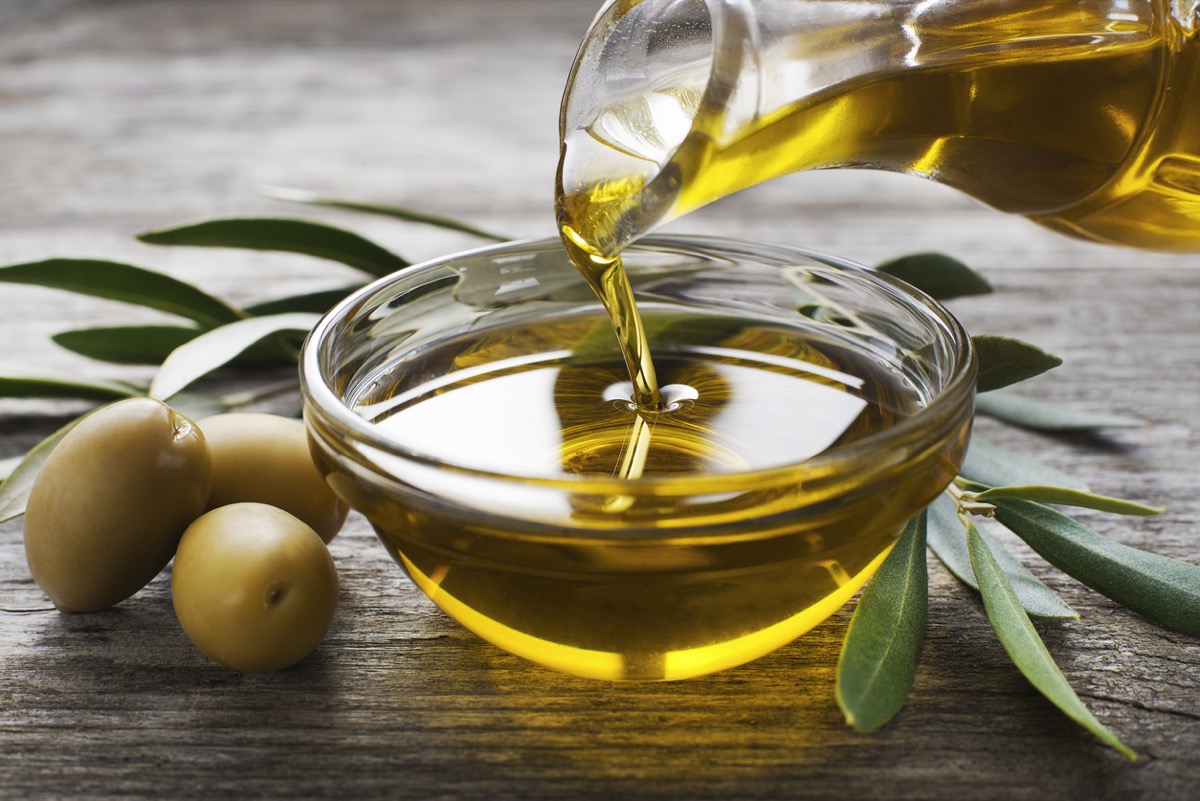
As the experts explain, it’s critical to get healthy fats into our diets while also avoiding those that cause inflammation. Choosing the right cooking oil—ideally extra-virgin olive oil (EVOO) over industrial vegetable seed oils—can increase your levels of healthy monounsaturated fats (MUFAs) and antioxidants, which can ultimately aid in weight loss and better overall health, says Gomer.
The dietitian explains that how healthy the oil is usually depends on how it’s produced. For example, you can imagine squeezing oil from an avocado and an olive using a press, which requires minimal processing. However, vegetable seed oils such as soybean, sunflower, canola, vegetable, and corn oils need to go through an involved process to make them edible.
“The oils must be extracted and refined, bleached, and deodorized before they are acceptable for human consumption. Therein lies the health issues,” Gomer tells Best Life. She adds that the seeds need to be heated to extremely high temperatures, which causes their unsaturated fatty acids to oxidize, creating harmful byproducts in the process.
“All of these chemicals contribute to the negative inflammatory side effects of these oils,” Gomer says. “The end result is an energy-dense, nutrient-poor oil that contains chemical residues, trans fats, and oxidized byproducts,” none of which are helpful for weight loss.
2
Avocado and coconut oil
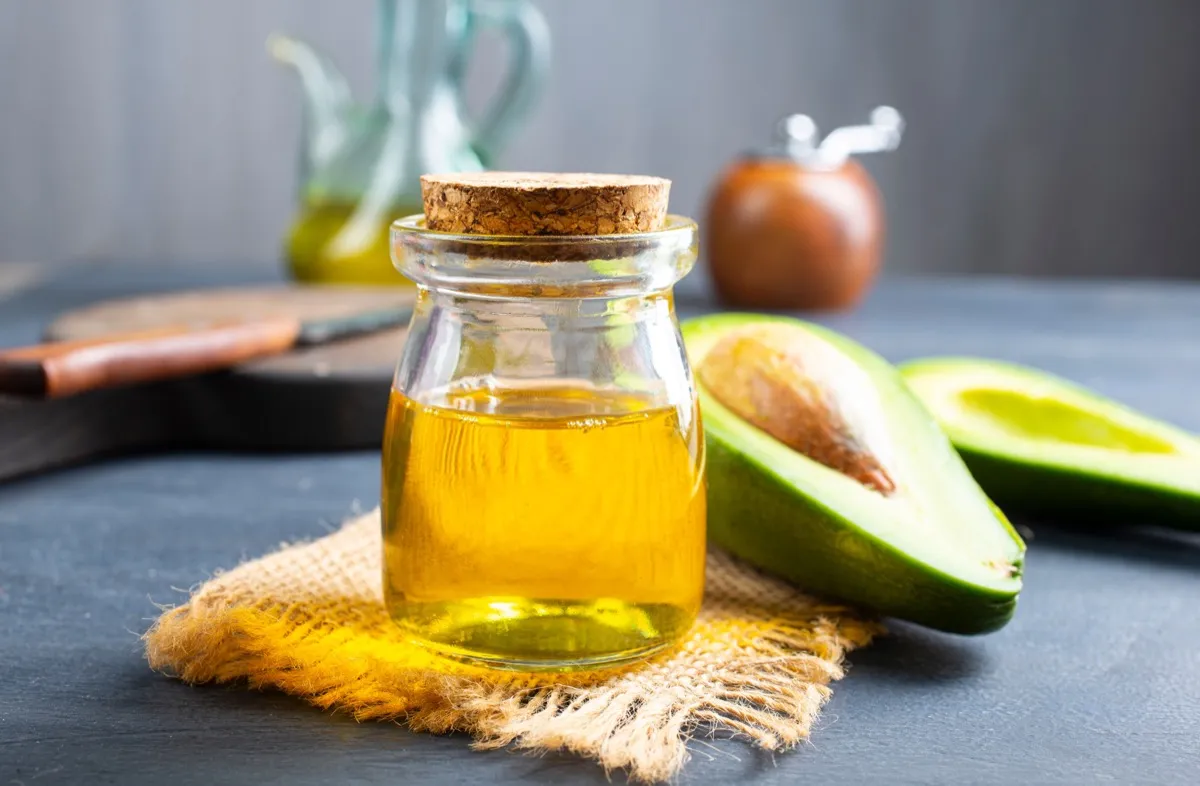
Olive oil isn’t the only healthy cooking oil that can aid in weight loss and improve your overall health. Avocado oil and coconut oil are two more examples of healthy, minimally processed oils that are rich in healthy fats.
Gomer notes that these are especially beneficial when they replace industrially processed oils.
“Industrial oils raise our omega-6-to-omega-3 fatty acid ratios, which can harm the heart and the gut. These seed oils are unstable, oxidize easily, and contain harmful additives. They are derived from GMO’s (Genetically Modified Crops). When these oils are repeatedly heated, even more toxic byproducts are created. They also aggravate the gut by being pro-inflammatory and can be responsible for bloating/gas symptoms,” she notes.
RELATED: 7 Best Protein Supplements for Weight Loss, According to Dietitians.
3
Nuts
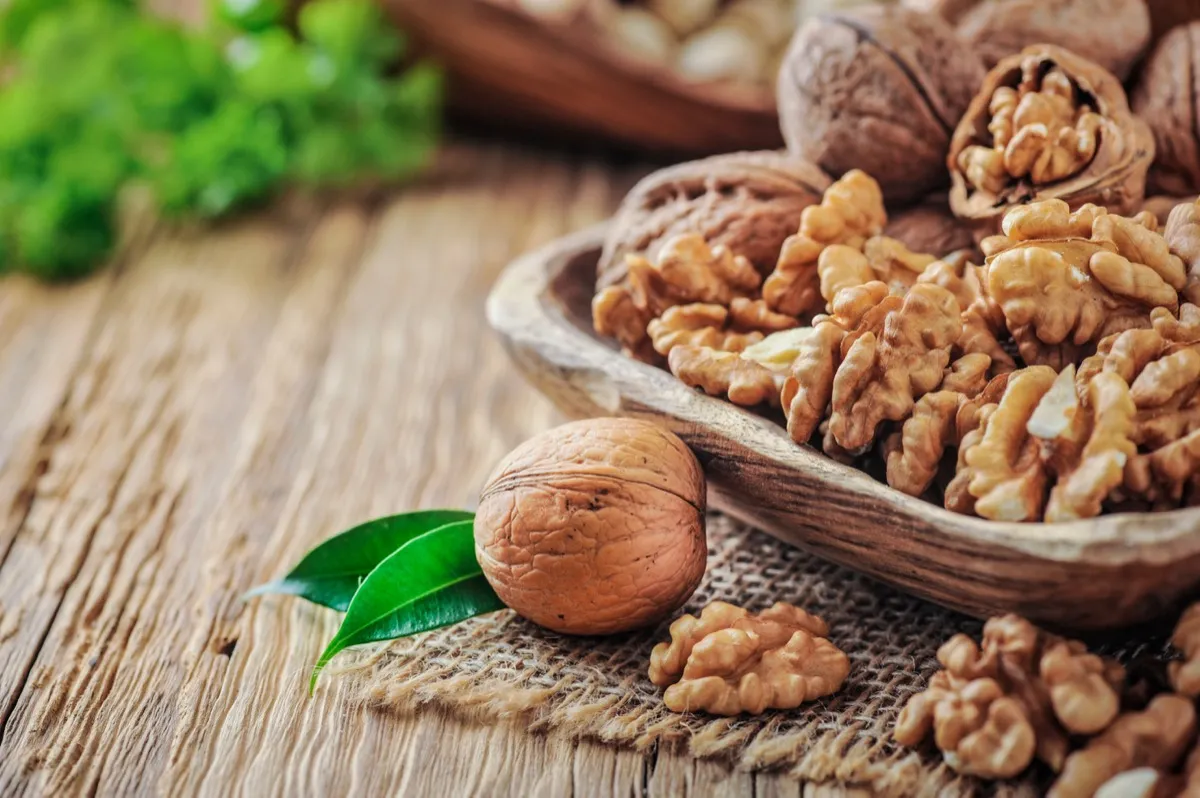
Nuts can be high in calories, so it’s a good idea to think carefully about portion sizes if weight loss is among your goals. However, they’re also rich in valuable omega-3 fatty acids, even when consumed in small amounts.
“Omega-3 fatty acids are polyunsaturated fatty fats that are incredibly healthy,” says Jennie Stanford, MD, an obesity medicine physician and medical contributor for Drugwatch. “They are important for cognitive functioning, immune health, vision, and cardiovascular health. Omega-3s are also potent antioxidants with anti-inflammatory properties, which helps reduce the risk of many chronic diseases, like heart disease and dementia,” she adds.
4
Seeds
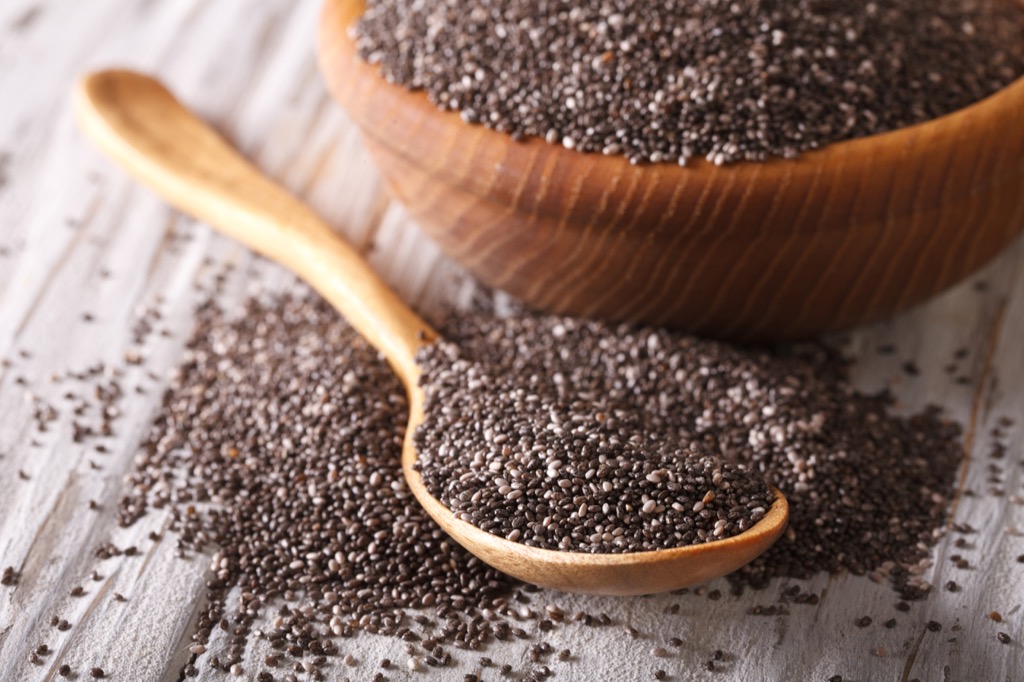
Seeds, including chia seeds, flaxseeds, pumpkin seeds, or sunflower seeds, offer similar health and weight loss benefits to nuts. Besides containing healthy fats, they’re also a good source of protein, fiber, vitamins B1, B2, B3, vitamin E, and minerals including magnesium, potassium, calcium, plant iron, and zinc.
Though research has contradictory conclusions regarding seed consumption and weight loss, some have found that specific seed types, such as chia seeds, may be beneficial within a broader healthy diet.
“Chia seed consumption, when combined with a hypocaloric diet, can lead to significant weight loss,” states a 2023 study published in the Journal of Medical and Health Sciences. “However, further research with longer intervention periods is necessary to establish the efficacy and optimal dosages of chia seed supplementation for effective weight management.”
RELATED: 5 Best Foods to Fight Inflammation, Doctors Say.
5
Avocados
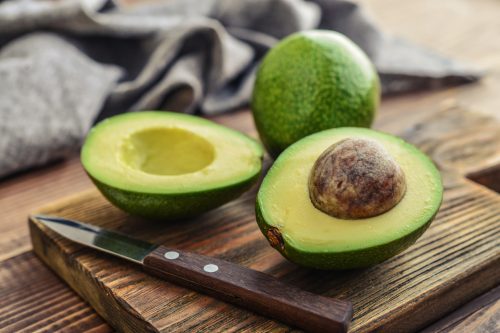
Gomer, who has over 25 years of experience in health coaching with a specialty in weight management, diabetes, and insulin resistance, also recommends eating avocados as a healthy source of fat for weight loss. These are rich in oleic acid, a monounsaturated omega-9 fatty acid that helps lower inflammation, she says.
A 2021 study published in the Journal of Nutrition found that people who eat avocados regularly tend to have “lower abdominal obesity compared with nonconsumers.”
“Further, in a longitudinal study among over 55,000 individuals, habitual consumption of avocados was associated with lower weight gain and reduced risk of having overweight or obesity when assessed 11 years later,” the study authors wrote.
The research team explains that nutrient-dense whole foods can serve as a nonpharmacological approach to modifying body fat distribution and alleviating the metabolic effects of adiposity.
“The avocado (Persea americana) is a fruit that is rich in dietary fiber and MUFAs, two nutrients that are beneficial for metabolic health,” the study states. “Diets rich in MUFAs and fiber have received considerable attention for their potential to reduce obesity and lower the risk of type 2 diabetes.”
6
Eggs

Gomer also recommends getting more healthy fats, including monounsaturated fats and polyunsaturated fats, from eggs. However, to do so, it’s important to eat the yolk.
“All the fat in an egg is found in the yolk,” explains the organization Egg Farmers of Canada. “Not only does the egg yolk contain healthy fats, it contains a ton of important fat-soluble nutrients like vitamins A, D, and E, and the antioxidants lutein and zeaxanthin. The healthy fats in the egg yolk actually help our bodies to absorb these nutrients in the yolk too.”
Of course, these are also high in lean protein, containing six grams per serving.
RELATED: Should You Use Meal-Replacement Shakes for Weight Loss? Doctors Weigh In.
7
Fatty fish
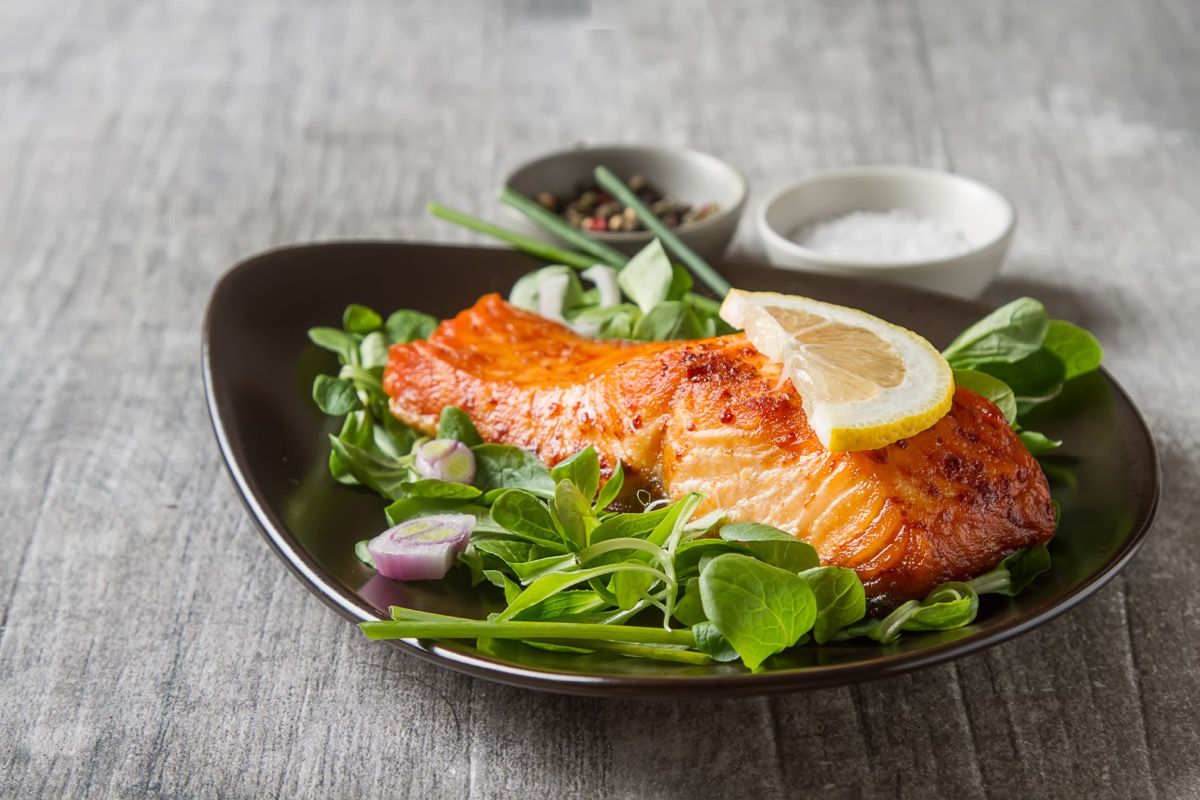
Stanford suggests eating fatty fish as another healthy source of omega-3s. In fact, many experts recommend eating eight ounces of low-mercury seafood per week for optimal health.
Besides being an excellent source of the omega-3 fatty acids EPA (eicosapentaenoic acid) and DHA (docosahexaenoic acid), they’re also packed with nutrients and lean protein, which can help you reach your weight loss goals.
In fact, according to a 2019 study published in the journal Nutrition Research Reviews, “Energy restriction combined with intake of lean and fatty seafood seems to increase weight loss.”
“Overweight and obesity development is for most individuals the result of years of positive energy balance. Evidence from intervention trials and animal studies suggests that frequent intake of lean seafood, as compared with intake of terrestrial meats, reduces energy intake by four to nine percent, sufficient to prevent a positive energy balance and obesity,” the study states.
They add that, when compared at equal energy intake, lean seafood reduces risk markers of insulin resistance and improves insulin sensitivity in insulin-resistant adults.